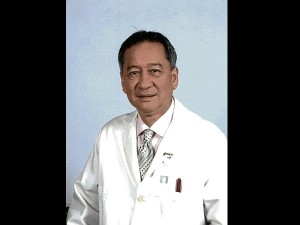Usually, the term “oncologist” elicits the same response—dread like the word “cancer.” But there are those oncologists who generate the opposite feelings—of hope and optimism.
In this writer’s 11 years of featuring various people, events and ideas for this paper’s Science and Health section, only a few medical personalities truly stand out. One of them is Dr. Antonio H. Villalon, venerably called the “Father of Medical Oncology” in the Philippines. So, it hasn’t come as a surprise to learn that a group of oncologists and allied healthcare professionals have been busy preparing a book for the good doctor, titled “The Spirit of Caring: A Tribute to Antonio H. Villalon, MD, FPCP, FPSMO, FACP.”
Experiences, anecdotes
The book, supposed to be finished in time for Villalon’s Oct. 19 birthday, has met delays as many more doctors still wanted to send their own experiences and anecdotes about the man. According to Sylvia Palma of Advocacies Convergence & Events Strategists, who helped compile the book, as of last count, a total of 10 oncologists and a nurse are in collaboration for the book.
“Compassion” has been the most often used word about Villalon, whose patients this writer had the chance to interact with. He has also been called a “superhero” by nurses and his patients, composed mostly of mothers, the elderly, and even nuns.
Wrote Cecilia Pena, former president of Philippine Oncology Nurses Association: “During the term of office of Dr. Antonio H. Villalon as president of the Philippine Society of Oncologists in 1993, he realized that the increasing number of cancer patients required nurses equipped with the right attitude and necessary knowledge and skills in the field of oncology nursing. Part of his dreams during his term as PSO president was to establish an organization of nurses whose leaders were in the field of cancer nursing. He started calling on directors of nursing services of various hospitals with cancer centers to organize the nursing specialty of oncology nurses.
Dream now a reality
“Little did we realize that the dream of Dr. Villalon would become a reality. The Philippine Oncology Nurses Association was born in 1993.”
Said Dr. Gloria Cristal Luna: “Dr. Villalon was more than our mentor. He was like our father. But we couldn’t very well call him ‘Dad’ for the simple reason that he was too young then. So we settled for ‘Sir,’ and more frequently, the less formal ‘Boss Tony.’ This was something we would fondly attach to him later on as we became closer to him.”
Dr. Adonis Guancia said: “Medical Oncology is a serious business. We understand this because of Dr. Villalon. But he also taught us a valuable lesson in simplicity and enjoying the simple things in life. He showed us how to stay grounded amidst the hope and optimism we sought to create in our patients. He nurtured in us the value of connecting with people, not only with our colleagues but also with our patients.”
A write-up by Dr. Karen Villanueva-Timbol poignantly read: “My aunt was a patient diagnosed with ovarian cancer. Eventually, my aunt consulted an oncologist by the name of Dr. Antonio Villalon. I was in college then, so I had very little knowledge about cancer, much less any information about Dr. Villalon. Very often, I remember that when my aunt and uncle would talk about the cancer and her treatment with Dr. Villalon, she would say, ’Why would I need to go through chemotherapy when all I need to do is just have one glance at Dr. Villalon, and this would already make me feel well?’
“I never knew that one day, fate would bring me the opportunity to find the answer to this question, and be mentored by the man himself.”
‘Defensive Medicine’
A speech delivered by Villalon on March 20, 2007 reveals his sentiments: “Gone are the days when patients loved their doctors and doctors truly cared. Indeed, the relationship between patients and doctors was much simpler. The only driving force at that time was the doctors’ ’love’ for his patients. Malpractice suits were unheard of. CT scans and MRIs were not available for clinical use.
“Now, doctors practice what we call ‘Defensive Medicine.’ We have to do all laboratory tests and CT scans so we don’t miss the diagnosis. Medical care has become too expensive. There has been a turnaround. Instead of protecting the patients’ welfare, doctors now protect theirs. ‘Damn if you do and damn if you don’t.’ Where do doctors stand?”
As far as Villalon’s patients are concerned, they know where their superhero stands on the ground, easy to reach and gather inner strength from.
